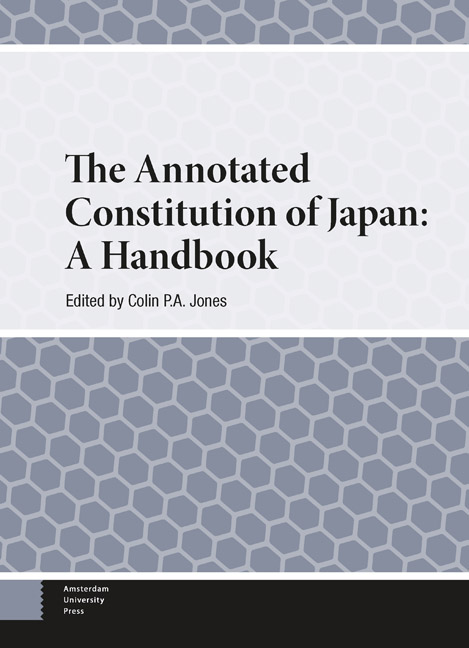Book contents
- Frontmatter
- Dedication
- Contents
- Contributors
- Preface
- Acknowledgements
- Introduction: Historical Overview
- The Preamble
- 1 Chapter I: The Emperor (Articles 1–8)
- 2 Chapter II: Renunciation of War (Article 9)
- 3 Chapter III: Rights and Duties of the People (Articles 10–40)
- 4 Chapter IV: The Diet (Articles 41–64)
- 5 Chapter V: The Cabinet (Articles 65–75)
- 6 Chapter VI: The Judiciary (Articles 76–82)
- 7 Chapter VII: Finance (Articles 83–91)
- 8 Chapter VIII: Local Self Government (Articles 92–95)
- 9 Chapter IX: Amendments (Article 96)
- 10 Chapter X: Supreme Law (Articles 97–99)
- 11 Chapter XI: Supplementary Provisions (Articles 100–103)
- Appendix 1 Constitution of the Empire of Japan (Japanese)
- Appendix 2 Constitution of the Empire of Japan (English translation)
- Appendix 3 The Potsdam Declaration
- Appendix 4 Instrument of Surrender
- Appendix 5 The “MacArthur Notes”
- Appendix 6 The GHQ Draft
- Appendix 7 The Constitution of Japan (Japanese)
- Appendix 8 The Treaty of San Francisco
- Bibliography
- Index
- Index of Articles of the Constitution of Japan
10 - Chapter X: Supreme Law (Articles 97–99)
Published online by Cambridge University Press: 13 February 2024
- Frontmatter
- Dedication
- Contents
- Contributors
- Preface
- Acknowledgements
- Introduction: Historical Overview
- The Preamble
- 1 Chapter I: The Emperor (Articles 1–8)
- 2 Chapter II: Renunciation of War (Article 9)
- 3 Chapter III: Rights and Duties of the People (Articles 10–40)
- 4 Chapter IV: The Diet (Articles 41–64)
- 5 Chapter V: The Cabinet (Articles 65–75)
- 6 Chapter VI: The Judiciary (Articles 76–82)
- 7 Chapter VII: Finance (Articles 83–91)
- 8 Chapter VIII: Local Self Government (Articles 92–95)
- 9 Chapter IX: Amendments (Article 96)
- 10 Chapter X: Supreme Law (Articles 97–99)
- 11 Chapter XI: Supplementary Provisions (Articles 100–103)
- Appendix 1 Constitution of the Empire of Japan (Japanese)
- Appendix 2 Constitution of the Empire of Japan (English translation)
- Appendix 3 The Potsdam Declaration
- Appendix 4 Instrument of Surrender
- Appendix 5 The “MacArthur Notes”
- Appendix 6 The GHQ Draft
- Appendix 7 The Constitution of Japan (Japanese)
- Appendix 8 The Treaty of San Francisco
- Bibliography
- Index
- Index of Articles of the Constitution of Japan
Summary
Overview
The three articles comprising Chapter X establish the constitution as the supreme law of the nation, though not without raising some questions about the status of international law. These three articles seem of paramount importance, as they articulate fundamental constitutional principles found in legal systems of most, if not all, modern liberal democracies.
Some commentators, however, have expressed reservations about or even openly criticized these articles for a variety of reasons. For example, one would expect fundamental provisions affecting the interpretation of the entire document to appear at the beginning, ideally in the preamble or first chapter. This would be a legitimate expectation especially in the case of texts with an important symbolic value and a profound political impact such as constitutions. In the Japanese constitution, however, this chapter appears at the end, sandwiched between the provisions on amendment and the now meaningless supplementary provisions of Chapter XI. While in principle the binding force of provisions of law does not depend on their position within the text, the location of Chapter X nonetheless appears a bit unusual and possibly diminishes its perceived importance. A common explanation is that the drafters felt that these provisions had to be included, but they did not find a better position in the document, so they placed them where they are for lack of better alternatives.
Similarly, in the final report of the Commission on the Constitution, several commissioners expressed the view that Chapter X did nothing more than repeat matters already dealt with in other articles, or state obvious things such as that the constitution should be upheld and respected, and that it is superior to other laws and regulations. In fact, the majority view was that all three articles of Chapter X were either unnecessary or wrongly placed, and they should be eliminated in the event of amendment.
Right to resistance and state of emergency
Japanese constitutional law scholars usually analyze the relation between the provisions of Chapter X and the doctrine of the right to resistance (teikōken), and the issues related to the validity of the constitution during a state of emergency.
- Type
- Chapter
- Information
- The Annotated Constitution of JapanA Handbook, pp. 312 - 322Publisher: Amsterdam University PressPrint publication year: 2023

